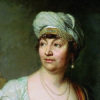Madame de Stael

Madame de Stael
Anne Louise Germaine de Staël-Holstein, commonly known as Madame de Staël, was a French woman of letters of Swiss origin whose lifetime overlapped with the events of the French Revolution and the Napoleonic era. She was one of Napoleon's principal opponents. Celebrated for her conversational eloquence, she participated actively in the political and intellectual life of her times. Her works, both critical and fictional, made their mark on the history of European Romanticism...
NationalityFrench
ProfessionWriter
Date of Birth22 April 1766
CountryFrance
A Gothic building engenders true religion ... The light, falling through colored glass, the singular forms of the architecture, unite to give a silent image of that infinite mystery which the soul for ever feels, and never comprehends.
There are women vain of advantages not connected with their persons, such as birth, rank, and fortune; it is difficult to feel less the dignity of the sex. The origin of all women may be called celestial, for their power is the offspring of the gifts of Nature; by yielding to pride and ambition they soon destroy the magic of their charms.
Taste is to literature what bon ton is in society.
Frivolity, under whatever form it appears, deprives attention of its power, thought of its originality, and sentiment of its depth.
Madame de Staël thought it was pride in mankind to endeavour to penetrate the secret of the universe; and speaking of the higher metaphysics she said: "I prefer the Lord's Prayer to it all.
It seems to me that life's circumstances, being ephemeral, teach us less about durable truths than the fictions based on those truths; and that the best lessons of delicacy and self-respect are to be found in novels where the feelings are so naturally portrayed that you fancy you are witnessing real life as you read.
Love is the symbol of eternity.
It is obvious that the most despotic forms of social organization would be suitable for inert men who are satisfied with the situation fate has placed them in, and that the most abstract form of democratic theory would be practicable among sages guided only by their reason. The only problem is to what degree it is possible to excite or to contain the passions without endangering public happiness.
To be totally understanding makes one very indulgent.
I desire no other proof of Christianity than the Lord's Prayer.
Life often seems like a long shipwreck of which the debris are friendship, glory, and love. - The shores of existence are strewn with them.
When a noble life has prepared old age, it is not decline that it reveals, but the first days of immortality.
The sense of this word among the Greeks affords the noblest definition of it; enthusiasm signifies God in us.
Wit lies in recognizing the resemblance among things which differ and the difference between things which are alike.